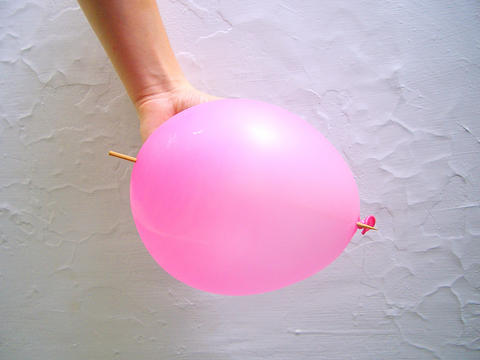Welcome to Sunday Science! Every Sunday during the summer, we're going to guide you through some cool experiments that you can do at home. It's a good idea for you to keep a record of what you do in a Science Journal. That way you can record what you learn, compare results and maybe use them to design new experiments! Have a look at the Science Journal box for some ideas to get you started. Remember to always ask a grown-up's permission before trying out an experiment.
歡迎閱讀《週日科學版》!在暑假期間,我們每週日都要為你介紹可以在家中進行的有趣科學實驗。你可以在《科學日誌》中記錄自己做了哪些活動,
這樣就可以將所學的紀錄下來,比較這些結果,也許還可以利用它們來設計新的實驗!先看一下《科學日誌》的點子再開始吧。展開實驗之前,

PHOTO: CATHERINE THOMAS, TAIPEI TIMES
記得要獲得大人許可喔!
This week you get to amaze your friends and family with a magic balloon!
Make sure you put down some newspaper as the oil will be a bit messy!
本週你要用神奇氣球讓親友們大感驚奇!記得先鋪上一些舊報紙,免得油會搞得亂七八糟。
What you will need:
Some good quality balloons
A bamboo or a metal skewer
Some cooking oil (baby oil will work too)
A saucer or a small dish
Some cotton buds (Q-tips)
Some newspaper
Wet wipes (optional - but very handy for removing oil from your hands!)
* Lay out some newspaper in a sensible area.
* Inflate some balloons and tie up the ends. Don't blow them up too big. Put the balloons aside for now.
* Pour some oil into the saucer or dish.
* If you are using bamboo skewers, rub them together to make sure there aren't any splinters.
* Put the end of a skewer in the oil, and use the cotton bud to spread the oil up and down the skewer. ? Pick up the balloon and find the nipple (the opposite end to the neck).
* Using a twisting motion, carefully push the skewer through the nipple.
* Keep twisting the skewer and aim it a little to the side of the tied end.
* Keep twisting until the skewer has come out of the other side of the balloon.
Don't forget to record what happens in your Science Journal.
所需材料︰
一些品質好的氣球
一根竹籤或鐵籤
少許食用油(嬰兒油也行)
一個小碟子
一些棉花棒(Q-tips)
幾張舊報紙
濕巾(非必要,但方便除去手上油漬)
* 在適當的地點鋪上幾張報紙。
* 吹氣球,但別吹太大,把尾端綁緊先擺在一邊。
* 倒些食用油在小碟子裡。
* 如果用的是竹籤,記得先摩擦一下以免有碎屑。
* 將長籤的一端浸入油裡,用棉花棒將油上下抹勻。拿起氣球並找到突起的頂端(尾端相反處)。
* 使用扭轉的方式,小心將長籤從頂端穿入。
* 繼續往綁緊的尾端旋轉前進。
* 不斷旋轉直到長籤從尾端附近穿出。
別忘了在《科學日誌》裡記下你的觀察。
(翻譯:張愛弟)
What's the science? 科學原理
Balloons are made of rubber. Rubber is made up of polymer chains. "Poly" means lots of something. A polymer chain is many large molecules linked together to form a chain. A balloon has lots of polymer chains. As you inflate the balloon you stretch the polymer chains apart. At the nipple and neck of the balloon the polymer chains aren't as stretched, so the skewer can go through there. The oil lubricates the skewer and helps it enter the balloon without causing too much friction, which would stretch the polymer chains.
氣球是由橡膠所製成的,橡膠是由聚合物鏈組成。「Poly」是很多的意思,一條聚合物鏈是由許多分子連結所組成,氣球包含許多聚合物分子鏈。當你吹氣時會把這些聚合物鏈撐開。但兩端的聚合物鏈沒被撐得這麼開,所以竹籤能穿過。油則潤滑了長籤,使它能減少摩擦,所以聚合物鏈才不會被摩擦力撐開。
Bonus 你知道嗎
Try putting some tape on the side of the balloon and twisting the skewer through. How many skewers can you get through a taped- up balloon?
試著在氣球側面貼一些膠帶,然後將長籤穿過。你能穿過多少根長籤呢?
Science Journal 科學日誌
What do you know about balloons? What are they made of? What happens if you try to put a sharp object against the surface of a balloon? Are inflated balloons fragile? Are balloons fragile or sturdy before they are inflated? What is oil used for on a bicycle chain? Is the skewer rough or smooth? Will oil make the skewer more rough or more smooth?
你對氣球的了解有多少?它們是什麼做的?如果用尖銳物戳它們的表面會怎樣?吹了氣的氣球很脆弱嗎?沒吹氣的呢?腳踏車的車鍊為什麼要上油?竹籤粗糙或光滑?油會讓它更粗糙或光滑?
Further ideas 進階點子
Try twisting a skewer through the sides of a balloon instead of the ends. What happens? Now try putting the oil on the balloon, instead of on the skewer. Does the trick still work? Why do you think this is? Don't forget to record your observations in your Science Journal.
試著從側面來刺入氣球,而不是兩端,會發生什麼事呢?再試著把油塗在氣球上,而非長籤上,這把戲會有效嗎?你為何這麼認為?別忘了在《科學日誌》裡記下你的觀察。
Next week 下週預告
For next Sunday's experiment you will need the following special items: vinegar, detergent, salt, some cola, four glasses and barbecue tongs.
下週日的科學實驗,你需要特別準備以下的東西︰醋、清潔劑、鹽、一些可樂、四個玻璃杯、幾個烤肉鉗。

US President Donald Trump has renewed his ambition to take control of Greenland for national security reasons and questioned whether Denmark has any legal right to the Arctic island. The debate has revived scrutiny of how Greenland became part of Denmark, its current self-rule and path to independence, and Washington’s military footprint. HOW DID DENMARK GET GREENLAND? Greenland was inhabited by Inuit peoples from Asia and North America intermittently from around 2,500 BC. Around 985 AD, Vikings led by Erik the Red settled in southern Greenland, farming and building churches. Around the same time, ancestors of today’s Inuit arrived, living as hunters

Have you ever gazed at the night sky and felt as though the Moon loomed larger than usual? Your eyes were not deceiving you. The Moon’s apparent size can __1__ subtly depending on where it is in its orbit. On certain occasions, it reaches its fullest phase while at its closest point to Earth. When these two events __2__, scientists and the public refer to the spectacle as a “supermoon.” The Moon does not orbit our planet in a perfect circle. Instead, it travels along a more oval-shaped __3__, completing one full orbit every 27 days. Consequently, there are times when

AI-generated summaries are shaking up the media world. Tools like Google’s AI Overviews now provide users with direct answers above the search results, resulting in fewer people clicking on news links. For publishers who rely on that traffic to generate advertising revenue, this shift is hitting hard. The fallout is measurable. Many sites have seen a sharp drop in traffic since AI summary features rolled out. An analysis revealed that a news outlet that had once ranked first on Google lost up to 79% of its traffic when its link appeared beneath an AI-generated summary. Statistics also show that

1. 展出的是幾幅張大千的名畫。 ˇ There are some masterpieces painted by Chang Dai-chien on exhibition. χ There are some masterpieces painting by Chang Dai-chien on exhibition. 註:現在分詞 painting 表明主動的或未完成的動作,這裏必須用過去分詞。現代英語裡,正句裡的 painted 一字,往往略去。若將 painting 視為名詞,則應加s — paintings. 2. 書前面有簡短的序言。 ˇ There is a short foreword preceding the book. χ There is a short foreword preceded the book. 註:precede 作「在……之前」解。a short foreword 是放在述詞後的主詞,應用現在分詞 preceding 表明主動的動作,句義與 There is a short foreword which precedes the book. 相同。 3. 你知道昨天發生的事故有誰在裡面嗎? ˇ Do you know anyone who was in the accident that happened yesterday? χ Do you know anyone who was in the accident happened yesterday? 註:錯句中的 happened 是過去分詞,一般過去分詞形式有被動的意義,但 happen 是不及物動詞,不能用作被動形式。若用現在分詞 happening 則表示未完成的動作,與中文原意不合。 請參考下列例句: 我上個月發表的有關創造力的文章,你讀過沒? ˇ Have you read my article about